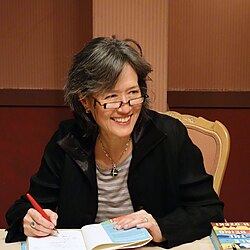Ruth Ozeki Quote
Later on, I asked her [her mother], How does it feel?What?When you can't remember things. Does it frighten you? Do you feel sad?Well, not really. I have this condition, you see. It's called osteo...ost...You mean Alzheimer's? I said, helping her out.She looked astonished. Yes! How on earth did you know that?Just a guess...I can never remember the name, she explained.Of course not.It affects my memory......And that's why you can't remember?She frowned and shook her head. Remember what?There's not a single thing I can do about it, she told me when I reminded her. If there was something I could do and wasn't doing it, then I could feel sad or depressed. But as it is... She shrugged.So you're okay with it?She looked at me, patiently. I don't have much choice, she explained. So I may as well be happy.
Later on, I asked her [her mother], How does it feel?What?When you can't remember things. Does it frighten you? Do you feel sad?Well, not really. I have this condition, you see. It's called osteo...ost...You mean Alzheimer's? I said, helping her out.She looked astonished. Yes! How on earth did you know that?Just a guess...I can never remember the name, she explained.Of course not.It affects my memory......And that's why you can't remember?She frowned and shook her head. Remember what?There's not a single thing I can do about it, she told me when I reminded her. If there was something I could do and wasn't doing it, then I could feel sad or depressed. But as it is... She shrugged.So you're okay with it?She looked at me, patiently. I don't have much choice, she explained. So I may as well be happy.
Related Quotes
People lack morals, good moral character is important in every aspect of your life. Honesty and Integrity opens the door. Your character allows others to see you for who you truly are. Make your first...
About Ruth Ozeki
